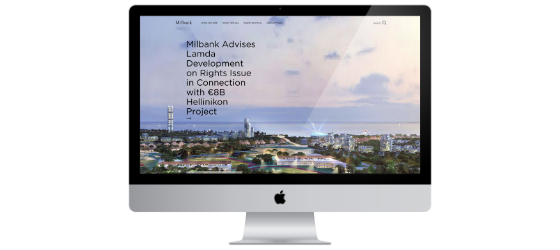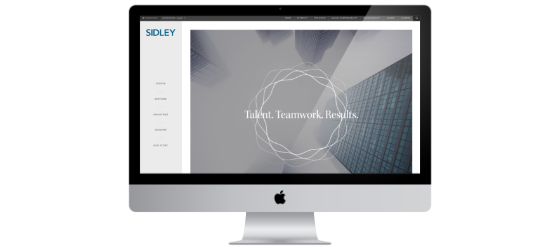AmLaw Global 50 Aggregate Scores
| # | Score | Description |
|---|---|---|
| 1 | 88.7 | Site offers easy-to-find, full-site keyword search |
| 2 | 72.7 | An advanced search link or options appears on all pages and enables visitors to narrow or refine the search in multiple ways |
| 3 | 64.9 | Search results are clear and well organized, and the most relevant categories (bios, experience) appear first |
| 4 | 56.1 | The site offers predictive, "did you mean," highlighting search terms in annotated results, exact phrase searches |
| 5 | 08.4 | Site offers separate experience search |
Top Trends + Insights
The attributes in the 2019 Study largely mirrored those in the 2016 research for FBP7 - Site Search.
- Stunningly, the Global 50 firm websites turned in a disappointing performance – largely worse than three years ago.
- In the 2016 Study only two firms scored “excellent,” but in this Study, no firm ranked that high. The highest score was 82.0 (“good”) and the top two scorers were Cooley and Eversheds Sutherland US
- For attribute #1 ("Site offers easy-to-find, full-site keyword search"), the Global 50 firms’ average score was 95 in 2016 and it went down to 88.7 in 2019. Still “excellent.” Those that didn’t score 100.0 on this attribute could rethink design so that the keyword search is more visible. 17 firms scored 100.0 in the latest Study, but in 2016, 40 firms scored 100.0. What happened here?
- "Advanced search link or option appears on all pages/visitors can refine the search in multiple ways" is attribute #2 – the average score also went down for this attribute from 75 in 2016 to 72.7 in 2019. Only nine firms scored 100.0 in this latest Study.
- For attribute #3 ("Search results are well organized and the most relevant categories appear first"), the score improved from 64.0 to 64.9 – both “fair.” Only eight firms scored 100.0.
- "And for offering predictive", 'did you mean,' etc., attribute #4, the average score moved slightly from 53.0 to 56.1 – very surprising given the many website redesigns among the Global 50 in the last three years. Only seven firms scored 100.0 on this attribute and nine firms scored zero.
Search remains the most important basic functionality that should satisfy your Type-A, business-day visitors. Yet, with a total average score of 58.0 (“fair”) these powerful law firms are not focusing enough on ensuring their visitors can easily find what they want and need.
The score for having a "separate experience search" (attribute #5) went down from 14.0 three years ago to 8.4 in 2019 – both “unacceptable.”
- Given that passing the “short-list test” is the first most important achievement by lawyers when it comes to people hiring them, it’s remarkable that firms are ignoring this critical evaluation tool. Visitors to a law firm website want to know these four things (exactly what the short-list test consists of): 1) What have you done? 2) For whom have you done it? 3) What can you do for me? And this is the newest question they have, 4) How do you do it or deliver it? If lawyers aren’t answering these fundamental questions, the prospect will simply continue to the next name on their shortlist. #HugeMissedOpportunity
- Only two firms scored 100.0 on having a separate experience search – Jones Day and Eversheds Sutherland US. A few others had partial experience-search functionality. In 2016, seven firms offered one.
- Search remains the most important basic functionality that should satisfy your Type-A, business-day visitors. Yet, with a total average score of 58.0 (“fair”) these powerful law firms are not focusing enough on ensuring their visitors can easily find what they want and need.
- 43 firms scored zero.
Most visitors have something in mind when they type in your URL. They are busy, often Type A buyers of legal services and they expect your search to deliver precisely what they’re looking for. Your job is to be a mind-reader. The most sophisticated search tools help you satisfy this. When a visitor searches for something and receives relevant answers in return, they feel smart – and they begin to feel that you are smart, too. If they can’t find what they think they should be able to find on an AmLaw Global 50 (or any other professional services firm) website, they unconsciously lose confidence in themselves and in your firm.
Having superior and multiple search features on your website adds complexity and cost to your project – but it’s one set of functionality that completely pays off.
A surprising number of AmLaw Global 50 sites still do not offer faceted search results – i.e., they were not organized by the global navigation category, such as People, Industries, and News. In searching “patent litigation,” for example, a visitor must sort through a seemingly infinite list of results and guess which results are the most relevant ones. This is a time-waster for visitors.
Standout Firms
Jones Day
This site employs an effective "experience search" as its own engine, and it is included as a category-filter tab for the global site search. The global search bar returns an extensive series of results with the keywords bolded. The best part about the main search engine is the number of categories available to use in refining search results, although a visitor can only choose one category at a time. There is a separate lawyer search with fewer filtering options.
Eversheds Sutherland US
This site stands out for its search customization abilities. Each page goes above and beyond in allowing the searcher to narrow down results and types of content. The global search bar directs a visitor to a unique page (which normally can be annoying), yet, the extensive "advanced" search makes this feature a welcome and inviting option.
McDermott Will & Emery
The one search feature that stands out here is that each page has a search bar inside the large hero image that is exclusive to that page’s content. The fact that four global sections of the site offer this functionality is unique.
Milbank
Possibly the most attractively designed, magazine-style search results page for the Global 50 firms, it quickly displays both news and articles, as well as lawyers with their headshots. Each page comes with at least some general refining tabs.
Cleary Gottlieb
Also called out in the 2016 Study, the global search provides a window with a predictive preview of a summary of the full results that quickly appears after typing in the search terms. One can click on the search arrow, taking a visitor to the full search results, or refine the results from the preview. The main search-results page is one of the best organized and uniform of all Global 50 firms – a high degree of usability and a strong hierarchy.
Sidley
This site’s global search engine is impressive, lots of predictive suggestions and an accurate auto-correct feature for misspelled words. It italicizes only the correction for a misspelling in the non-italicized predictive results, so a visitor can easily discover the error they made. Although it does not automatically group the like kinds of content, the results page uses a tab system that is unique to each search, only displaying refining tabs that would bring up pages with your keywords. It also bolds the keywords when displaying each result.
Do's
| Do remember: It’s never about searching – it’s always about finding. | |
| Do understand that the vast majority of your business-day visitors are searchers – and they are distracted and busy. A lightning fast, accurate website search is critical to visitors trusting that your firm can best serve them. | |
| Do organize search results so that the most relevant categories (bios and experience) appear first on the list, versus having to hunt through an unsorted list of results to find the one important result. Buyers of legal services go to a law firm website to find lawyers first (the analytics we track prove that 50-75% of all visitors to a law firm website view lawyer bios), then they want to view relevant experience (they want you to prove that you are the right person and firm to hire). | |
| Do know that the easiest way to shortcut the pathway to trust between your visitor and you/ your firm is to give them what they want. Invest much, much more time and rigor in building and delivering more comprehensive search features. | |
| Do ensure that a visitor’s search terms are highlighted in the annotated results. Make it easy on them to find what they want. | |
| Do always include an advanced search option on the news, events and publications pages and, of course, in the People section. | |
| Do fully test your mobile search features and view search results with a discriminating and critical eye. If your phone search results are in tiny text, the links will be impossible to click on with a fingertip – and that is completely maddening to your busy, on-the-go visitors. | |
| Do make it easy to search again – include a “search again” link intuitively near all search results. | |
| Do include an experience search where a visitor can sort and parse in the categories most important to their problem, opportunity or organization. | |
| Do include a language search on the People landing page. All global firms should offer this. | |
| Do offer translations of your search results. |
Don'ts
| Don’t waste your visitors’ precious time by delivering irrelevant search results to them. | |
| Don’t forget that receiving “no results found” on a large professional services’ firm website is frustrating to all visitors. Is it because your search features aren’t robust enough to help you satisfy their request? | |
| Don’t compromise your visitors’ experiences (and risk a poor impression of your firm) by not dedicating the right budget to your search. Don’t cut corners here. Your visitors and you will regret it. | |
| Don’t forget to use filters that will be helpful to your non-American or non-UK visitors. For example, include location and language searches in your People advanced search. | |
| Don’t forget to fully test the functionality, responsiveness and relevance of every search feature and search result on all your sites – desktop, tablet and phone. Too many designers put the search box in the upper right hand corner and check it off their list without knowing if it really works from a visitor’s point of view. It’s up to the law firm to test and retest to ensure the search results are high-performing – that is, accurate and relevant. | |
| Don’t forget that your visitors search like you do! Design functionality that would be easy for you to use. |







